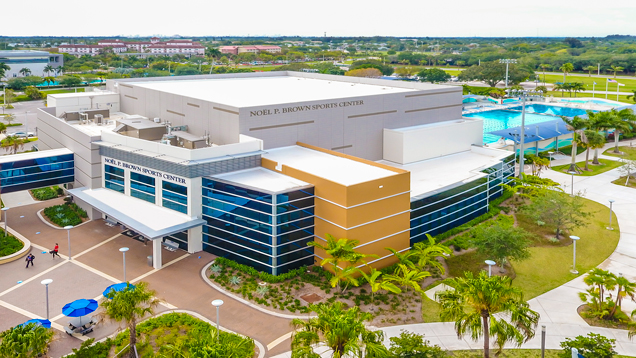Dive into a world of aquatic possibilities with NSU Aquatics!
Whether you're a fitness enthusiast seeking lap lanes, a thrill-seeker eyeing the diving well, or simply looking for a refreshing leisure swim, our state-of-the-art facilities cater to all aquatic interests. Our highly trained lifeguards ensure safety with advanced rescue equipment and adherence to American Red Cross standards. AccuWeather meteorologists provide real-time weather updates. NSU Aquatics offers a fun and secure environment for you to make a splash.
Our Facilities
NSU Aquatics currently operates three swimming pools designed to meet all of your aquatic needs:
- Competition Pool: One of Florida's largest outdoor pools (5' to 16.5' depth), convertible between Olympic
(50m) and NCAA (25y) standards. Dividable by a floating bulkhead.
- Diving Well: Separate well with space for 7 short-course yards (SCY) lanes, featuring two 1-meter and one 3-meter diving boards.
- Main Leisure Pool: This half-Olympic sized pool (up to 5ft deep) offers year-round swimming inside the NSU RecPlex. Perfect for relaxation, it features lounge chairs, shaded areas, and tables. Our learn-to-swim program calls this pool home, and it's a popular spot for campus events.
- Rolling Hills Pool: Exclusive to residents, this resort-style pool features beautiful landscaping, a rock waterfall, and a zero-entry point. Relax by the pool, party with friends, or even study in the indoor lounge or outdoor pavilion.
Hours of Operation
Competition Pool Open Lap-Swim*:
Monday - Friday | 12:00 - 2:00 p.m.
*Open swim is exclusive to the NSU Community. Please bring your SharkID to gain access.
*Open swim hours are subject to sudden change.
RecPlex Leisure Pool:
Monday - Friday | 8:00 a.m. - 8:00 p.m.
Saturday | 8:00 a.m. - 4:00 p.m.
Sunday | 12:00 - 4:00 p.m.
*Leisure Pool hours are subject to sudden change, and contingent on RecPlex hours of operation.

Lifeguarding Certifications
Interested in earning your American Red Cross lifeguarding certification, and/or working for NSU Aquatics? Email: jc3964@nova.edu or Call: (954) 262-3901.
NSU Aquatics Staff
For general questions regarding our facilities, including how to rent the competition pool for your organization's training purposes, please email nsuaquatics@nova.edu, or contact a member of our staff.








